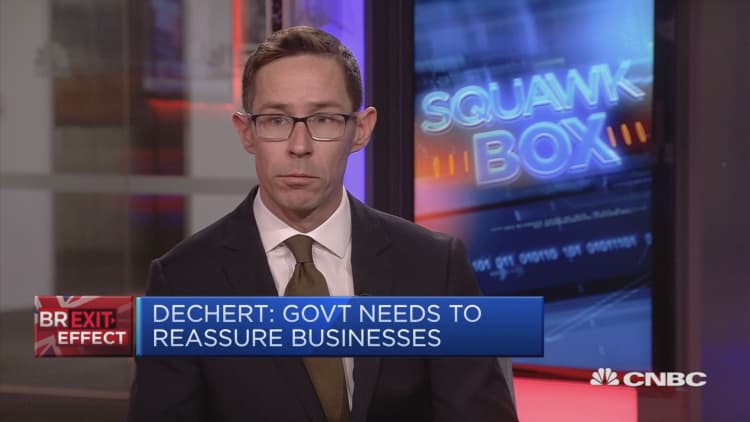The U.K. government is preparing 11 trade deals to reduce the economic impact of leaving the European Union. However, all this work might be in vain.
The department led by Liam Fox cannot negotiate any trade deal while a member of the European Union – . It can, however, have discussions with potential partners.
As such, the government is exploring how to potentially deepen its trade links with 11 partners:
- the United States,
- Australia,
- China,
- the Gulf Cooperation Council (GCC),
- Israel,
- India,
- Mexico,
- New Zealand,
- Norway,
- Turkey,
- South Korea.
But this preparatory work may never see the light of day. "It really depends whether the U.K. can sign off the deals during the transitional period, such that they automatically come into force after the transitional period is over," Kallum Pickering, senior U.K. economist at Berenberg, told CNBC on Friday.
Furthermore, the U.K. has said that it needs a transition period to allow businesses to adapt and prepare for a post-Brexit world. This transition period might be as long as three years, which would mean that the U.K. will have some sort of link with the union until 2022.
"We won't know whether (the possibility of making trade deals) will be a feature of the transitional period until there is 'sufficient progress' on the Brexit divorce and the transitional framework can thus be negotiated," Pickering told CNBC.
The EU seems unlikely to agree to do that. In its guidelines for the Brexit negotiations the EU stated: "Should a time-limited prolongation of Union acquis ( a body of common rights and obligations) be considered, this would require existing Union regulatory, budgetary, supervisory, judiciary and enforcement instruments and structures to apply." This statement seems to suggest that the current rules i.e. on negotiating trade deals would continue to apply during the transition period.

However, even if the EU agrees to that, the U.K. might not be able to convince new partners to strike deals without first negotiating its trade links with the EU.
", before agreeing a meaningful bilateral trade agreement with the UK. The EU market is simply too important for UK-based business," Rem Korteweg, head of Europe in the World unit at the Netherlands Institute of International Relations, told CNBC.
In other words, if an investor in the U.S. or in India isn't sure whether a U.K.-based factory will face trade barriers when selling to the EU market, he or she is unlikely to buy that factory.
"Since the is also meant to buy time to negotiate the future EU-UK trade relationship, it is highly unlikely that a meaningful trade deal will be finalized during that period," Korteweg said.
Though the U.K. has the freedom to explore new trade deals, talk about them, prepare for them, sign letters of intent with potential suitors, signal its interest, set up joint working groups, these actions do not constitute a final free trade agreement in themselves.
According to Korteweg, "such flirts do not make a marriage."


